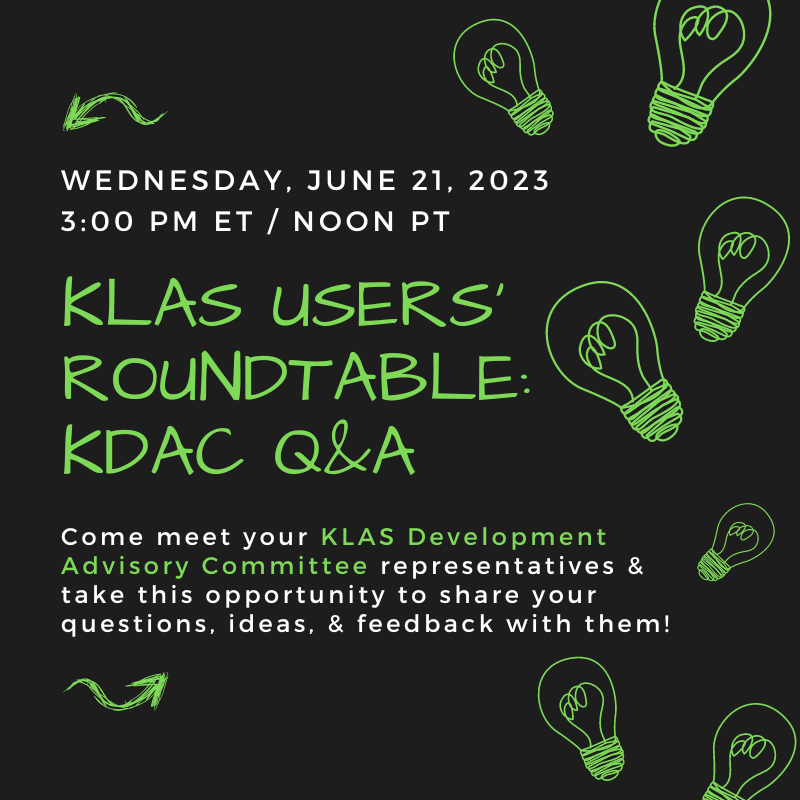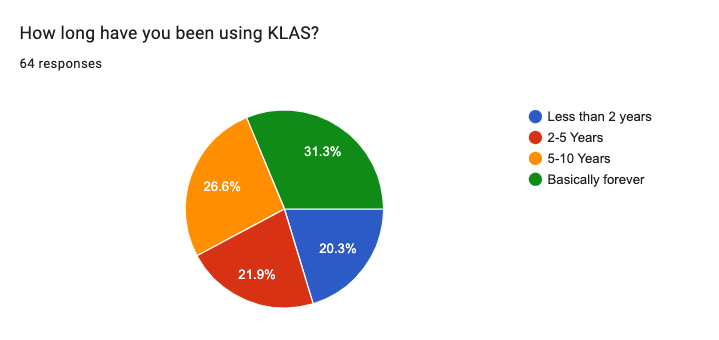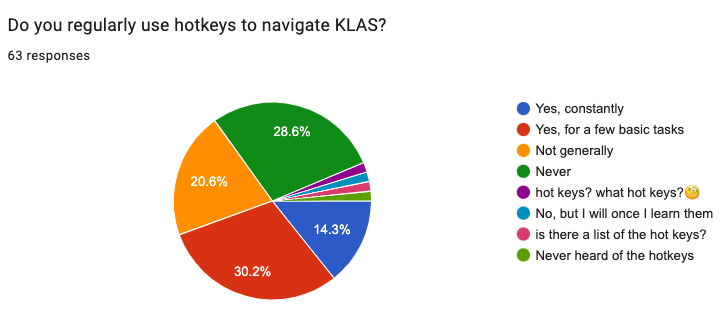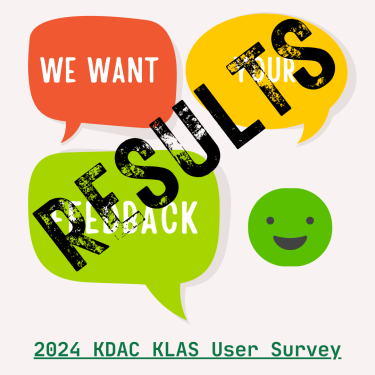KDAC
-
2024 KDAC KLAS User Survey

-
6/21/2023 KLAS Users' Roundtable: KDAC Q&A

On Wednesday, June 21 at 3:00 PM Eastern / Noon Pacific we held our most recent KLAS Users' Roundtable: KDAC Q&A.
During this online session KLAS Users had opportunity to meet KLAS Development Advisory Committee (KDAC) representatives, ask them questions about being on the committee and / or how it operates, share ideas for improvements to KLAS, and more!
Current KDAC Members include:
- Dan Malosh, Committee Chair, Minnesota Braille and Talking Book Library
- Traci Timmons, KLAS Users' Group Officers' Liaison, Washington Talking Book and Braille Library
- Barnaby Camp, Georgia Library Service for the Blind and Print Disabled
- Christina Quintana, Arizona Instructional Resource Center
- Donald Salvato, Xavier Society for the Blind
- Dorothy Hughes, Maryland School for the Blind
- Jesse McGarity, Virginia Beach Public Library, Accessible Resources and Services
- Pepper Watson, Oklahoma Accessible Instructional Materials Center
- Sally Shreck, Maryland Instructional Resource Center
- Sarah Smedley, Palm Beach County Library Talking Books
- Zoelinna Schar, Nevada Talking Book Services
KLAS Users' Roundtable: KDAC Q&A Chat Transcript & Recording
Follow-up notes from Katy: The instructions for changing font size in KLAS are now available in the Knowledge Base!
However, to add or remove stopwords, you must contact customer support so that the appropriate indexing can be done after the change. Additionally, we believe all libraries are set up with the usual stopwords (a, an, the)--if that does not seem to be the case for your library, please contact customer support with example screenshots.
-
January 2021 KDAC Survey

Your KLAS Development Advisory Committee (KDAC) member-representatives want to hear if you have input for our next meeting to be held January 19, 2021. Therefore please complete this survey to share your input with us, and please know we sincerely appreciate your thoughts and feedback.
-
KDAC Update & Thank You

From Sam Lundberg, President, KLAS Development Advisory Committee:
It’s been a few months now since the KLAS User Experience Survey circulated, and the KLAS Development Advisory Committee (KDAC) has spent the time pouring over all the answers we received. Some of you had small, actionable requests that will hopefully be coming down the pipeline soon. Others had big ideas that, rather than being added now, will help inform the next major iteration of KLAS. Finally, are my personal favorite suggestions: small quality-of-life fixes that make each day that 1% easier.
I can’t say exactly what will be coming next or which features will make it to live. We certainly had some common threads around the Service Queue, updating catalog records, the WebOPAC, and tools to handle Has-Had titles. The changes that DoD makes for patron service are starting to become clear and more feedback on how to mechanically address those changes will be vital. I believe there will also be some training coming to discuss requested features that are actually already part of KLAS, if not always obvious.
The survey was anonymous, so I can’t get into the details of the responses. But I can share some interesting demographics data we gathered. Nearly ⅓ of responses came from users with more than 10 years experience with KLAS. Only 14% of responders use hotkeys constantly within KLAS, while 30% use them occasionally and 29% never use them at all.* The klasusers,com discussion forum is still under-appreciated with only 33% of responders saying they use it to interact with the KLAS community, but almost 70% attend the KLAS Conference, webinars, and/or the listserv. Reviewing anonymous survey responses proved tricky because we found many suggestions we wish had more detail or clarification, but that’s the tradeoff for honest feedback on what’s wrong now as well as what we want in the future.

Of course, the conversation doesn’t end with the survey. Keystone and KDAC are always looking at the forum, the listserv, the various live training sessions and presentations (organized or organic), and all other ways users talk to one another. Also, we invite you to speak with any KDAC officer directly about anything you’d like us to put forward. Development is an ongoing conversation about what would be good to add, but also about priorities and allocation of resources. Even if you know something you want is in the works or on the table, be sure to also let us know the importance of that change or feature to you or your library so it can get that extra oomph behind it.
Finally, because I haven’t said it yet in this letter, thank you all for your participation in the survey specifically and the broad mission of KLAS Development generally!
*Note from Katy: If you are among those who don't know what they Keyboard commands are or who need a list to help you become more familiar with them, check out the KLAS Keyboard Shortcut page for a reference.
-
RESULTS! 2024 KDAC KLAS Users Survey

This week's KeyNotes blog post is a guest post from KLAS User Development Advisory Committee Members Jesse McGarity, Virginia Beach Public Library Accessible Resources and Services and Barnaby Camp, Georgia Library Service for the Blind and Print Disabled.
Thank you to everyone that responded to the KLAS Development and Advisory Committee (KDAC) survey. Of the 69 respondents, 88.4% worked for a Library for the Blind and Print Disabled (LBPD), 10.1% for an Instructional Resource / MaterialsCenter (IRC / IMC), while the remaining 1.5% identified as a School Library / Association / Other. The sample included librarians, reader advisors, BARD administrators, and other professionals. The purpose of the survey was to identify to KLAS developers the improvements or updated features that were the highest priority for users.
94% of respondents said they used the patron module daily, with the book search as the most used function, while 68% used the catalog module with heading maintenance as the most mentioned. Some users wished the search function would use Boolian operators. The highest priority for all respondents was to add an "Undo Function" for accidental merges in heading maintenance, restoring both headings to books and likes/dislikes to patrons. Next, was the ability to mark items previously marked as lost as something else (e.g., Lost-Returned) when returned, clarifying their status. Following, was to add a button that transfers current search parameters from "Find" to a query set in another window, enabling quick toggling through book records for copy/pasting subjects when "Title" exists in multiple formats.
There was a strong interest from IRCs for linking a related patron record as a 'contact,' ensuring that changes to preferred contact information on that record are reflected in the primary record. The most highly ranked potential update for LBPHs was checking the PIMMS database for existing patrons with the same name and birth year when adding a new patron record. Other high-priority improvements for LBPHs included allowing composite subject likes/dislikes for patron preferences, allowing users to sort orders by the last status date, and creating a new order type to send cartridges to patrons that don't count against their cartridge limit (the NSCutoff), also the ability to account for multiple medium/reading level situations on the same patron/institution record, for example to allow for “Large print - K-3," "Braille - 4-7," "Digital books - 8," all on the same account and to allow libraries to retain pre-bundled duplication orders .
Finally, in the open “red stapler” section, several respondents identified arranging series order in the service queue as one of their more tedious tasks. The question was asked on what would be the best way for KLAS to handle series. The majority preferred option B, which sends out the earliest book in a series that is not marked "Has/Had" and positions it relative to other books in the same series in the queue.
Thanks again to everyone who responded!

